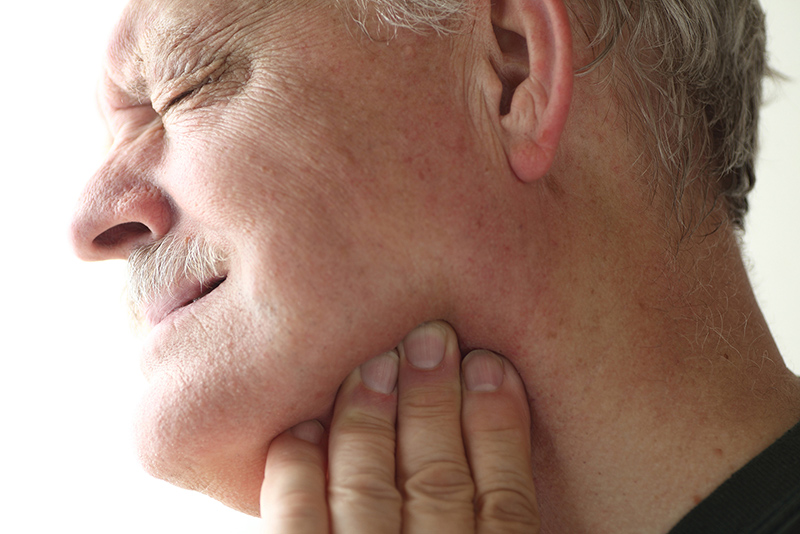 (Temporomandibular Joint Syndrome) TMJ or Temporomandibular Joint Syndrome is a painful condition of the jaw that involves the hinge joint (TMJ) which allows you to open and close your mouth. You have two TMJ joints, one on each side of your mouth or face. Temporomandibular Joint Syndrome is also referred to as Temporomandibular Joint Disorder or Temporomandibular Joint Dysfunction. The muscles involved in chewing open and close your mouth as well as allow you to glide or jut your jaw forward and side to side. Coordination of the various muscles of the jaw is essential to proper and painless jaw function. Imbalance in the muscles of the jaw can often cause jaw pain or jaw dysfunction which may show up as "clicking" or "popping" sounds during talking or chewing.
(Temporomandibular Joint Syndrome) TMJ or Temporomandibular Joint Syndrome is a painful condition of the jaw that involves the hinge joint (TMJ) which allows you to open and close your mouth. You have two TMJ joints, one on each side of your mouth or face. Temporomandibular Joint Syndrome is also referred to as Temporomandibular Joint Disorder or Temporomandibular Joint Dysfunction. The muscles involved in chewing open and close your mouth as well as allow you to glide or jut your jaw forward and side to side. Coordination of the various muscles of the jaw is essential to proper and painless jaw function. Imbalance in the muscles of the jaw can often cause jaw pain or jaw dysfunction which may show up as "clicking" or "popping" sounds during talking or chewing.
Function of TMJ Syndrome
When you open your mouth the lower surface of the TMJ or condyles glide forward. When you close your mouth the condyles glide back into their original position. It works like a hinge and is known as a "hinge joint". To assist in smooth operation of this movement, a soft disc of cartilage known as a meniscus, lies between the condyles and the inner surface of the joint. The disc serves to absorb and distribute shock to the TMJ from chewing, talking and yawning which are repetitive movements that occur thousands of times every day. The strongest muscle in the body by weight and size is the masseter muscle of the jaw and it can apply a force of up to 200 lbs to the molars of the back of your mouth located by the TMJ. The disc serves to distriubute the forces of chewing evenly throughout the joint.
Signs and Symptoms of TMJ Syndrome
- Jaw pain with talking, chewing or yawning
- Neck pain with talking, chewing or yawning
- Jaw clicking, grinding or popping with talking, chewing or yawning
- Ear pain or ringing in the ears (tinnitus)
- Tenderness and/or swelling in the area of the TMJ on the affected side
- Inability to fully open or completely close the mouth
- Headaches
- Direct trauma from a blow or a sports, auto or work related accident
- Repetitive grinding or clenching of the teeth
- Prolonged dental work
- Excessive chewing of gum or hard candies and foods
- Arthritic degeneration
Two types of TMJ disorders that can be helped through Chiropractic care are:
1. TMJ Muscular Imbalance: This condition of the TMJ occurs when one or several of the muscles of the jaw are simply too tight or in spasm, causing the jaw to shift to the right or to the left during opening and closing of the mouth. This continuous abnormal shifting of the jaw irritates the TMJ, causing pain, irritation and inflammation of the joint which leads to the pain and spasm cycle. In other words, pain causes spasm and spasm in-turn causes more pain in an ongoing vicious cycle. This condition can be effectively treated through specialized massage, done by the doctor, to the muscles of the TMJ that are in spasm which stops the pain and spam cycle and helps to restore normal function to the jaw.
2. Acute TMJ Dysfunction: This condition typically occurs when sudden trauma to the jaw causes displacement of the cartilage pad in the jaw known as the meniscus. The jaw typically locks and it becomes difficult and painful to open or close the mouth or to talk, chew or yawn. The trauma can be in the form of a blow from a punch or a sports, auto or work related accident. It can also occur during the normal course of eating food that requires hard chewing or during a big yawn. This condition can be effectively treated through a specialized manipulation or adjustment to the jaw, done by the doctor, on the affected side which often immediately corrects the condition. (However in certain cases it does take multiple treatments)
If you, or a loved one, are experiencing pain contact our office to schedule a free NO obligation consultation with the doctor or email Dr. Garber with a question concerning your case for a quick response. Garber Chiropractic Care Center 770-386-7707
Chiropractic Care and Pain Relief for Cartersville, Acworth, Taylorsville, White and Euharlee GA.
